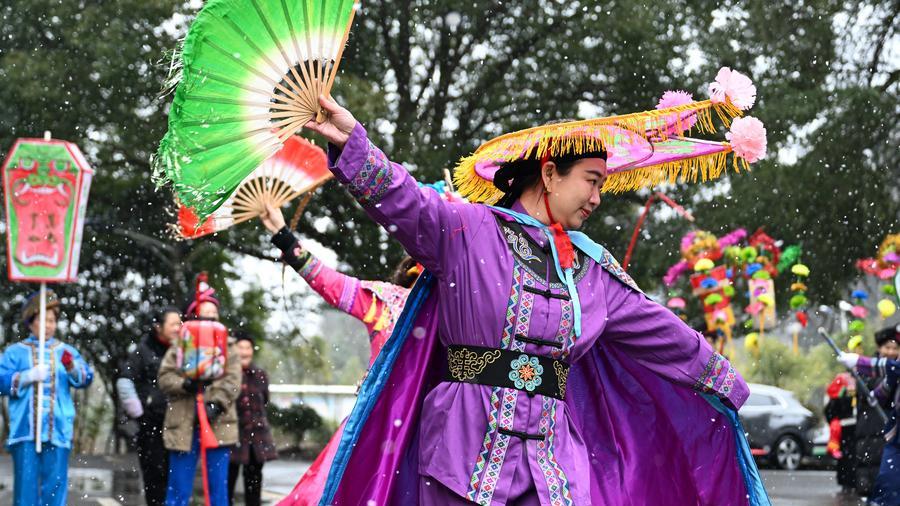Has BBC changed its China coverage strategy? Recent positive stories surprise Chinese netizens
The BBC recently published several positive reports about China, covering topics such as the box office success of the Chinese film Ne Zha 2, China's technological achievements, and the history of the naming of the Gulf of Mexico. This sudden shift by the BBC, a Western media outlet long known for its critical stance toward China, has sparked heated discussions among Chinese netizens.
In its coverage of China's animated epic Ne Zha 2, the BBC moved away from its typically sarcastic tone and removed the "filter" it has long used when observing issues related to China. The BBC noted that the movie's success not only showcases the rising strength of Chinese animation but also demonstrates the infinite possibilities of traditional Chinese mythology in a modern context.
Many Chinese netizens were also surprised by a recent video titled "DeepSeek, TikTok, Temu: How China is Taking the Lead in Tech." The report cited examples such as DeepSeek, TikTok, CapCut, Shein, Temu, BYD, DJI, and Huawei, claiming that Chinese technology is everywhere and that in many areas, China is challenging the former high-tech powerhouses.
A technology blogger on China's Weibo platform, who has more than 7.7 million followers, said in a post on Wednesday, "The BBC report left me a bit stunned."
"The entire piece is filled with excessive praise, highlighting drones, electric vehicles, chips, and DeepSeek, all in quick succession," the blogger said. "Even the shortcomings in chip manufacturing were presented as breakthroughs despite global blockades."
"What is even more surprising was that the BBC credited China's achievements to its institutional advantages, praising the system — a rare stance in Western media. This sudden shift in tone was quite jarring. Where did that previously defiant attitude go?" the blogger asked.
For a long time, the BBC has been seen as the "vanguard of anti-China sentiment." Whenever it comes to China-related topics, the angle is always critical and questioning. Even if the opening is positive, it is often followed by a jab, typically with a line like, "But at what cost?"
They have often used grim filters, shaky camera work, and manipulated content — mixing facts and distorting the truth. Under the BBC's framing, Xinjiang cotton and tomatoes were said to be produced through "forced labor," and the street protests in Hong Kong were portrayed as a "beautiful scene."
So, what happened to the BBC?
Some Chinese netizens and experts generally believe that this shift is closely related to the closure of the US Agency for International Development (USAID).
"Like many international development organizations, BBC Media Action has been affected by the temporary pause in US government funding, which amounts to about 8 percent of our income in 2023-24," the BBC stated in a release on its website on February 4.
However, BBC Media Action also emphasized that, as the BBC's international charity, "we are completely separate from BBC News and are wholly reliant on our donors and supporters to carry out our work."
From the perspective of global communication and international public opinion, the clear effect of the US cutting off funding is worth considering for a new understanding: If you come across negative reports about China, you should ask yourself whether they are paid-for fabricated information or persistent, self-serving nonsense, said Shen Yi, a professor at Fudan University, in an interview with the Global Times on Thursday.
The BBC's shift in its reporting on China has been seen by some Chinese netizens as an "alternative way of asking for payment." They believe that without financial support from the US, the BBC changed its way of reporting on China.
Meanwhile, Lyu Xiang, a research fellow at the Chinese Academy of Social Sciences, questioned whether the recent positive reports truly represent a shift in the BBC's stance on China.
"I don't think the change has been that quick, because the decision to cut USAID is still a recent development. For an organization like the BBC, such a swift shift in stance may not be directly related to that," Lyu said.
For example, DeepSeek has indeed caused a global stir, even shaking the US stock market. Given such a significant event, it might have prompted these Western media to take China's technological development more seriously, Lyu said.
Whether it's the Voice of America or the BBC, their reporting often creates a polarized narrative, positioning China and the West in stark opposition. As long as these media outlets exist, this way of reporting is unlikely to change in the short term, Lyu noted.
"However, in the face of China's growing power, I think it's becoming increasingly difficult for them to deny China's success," Lyu added.
Photos
Related Stories
- China ready to work with Britain to consolidate bilateral ties: FM
- Royal Academy of Music hosts China-UK cultural exchange
- Chinese FM to visit UK, Ireland, attend 61st MSC, chair UN Security Council high-level event, attend G20 foreign ministers' meeting
- Chinese ambassador calls for "icebreaking" spirit when dealing with China-Britain ties
- Wisdom I have learned from a Chinese painting
Copyright © 2025 People's Daily Online. All Rights Reserved.









